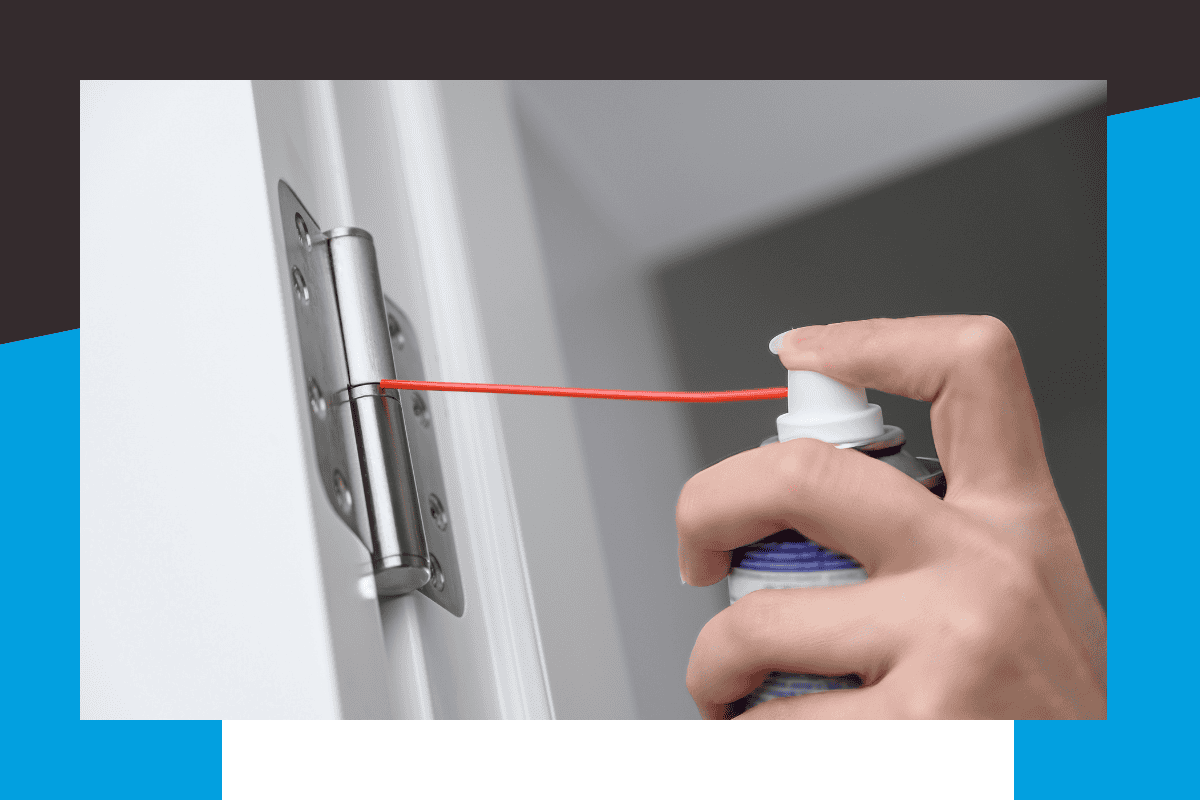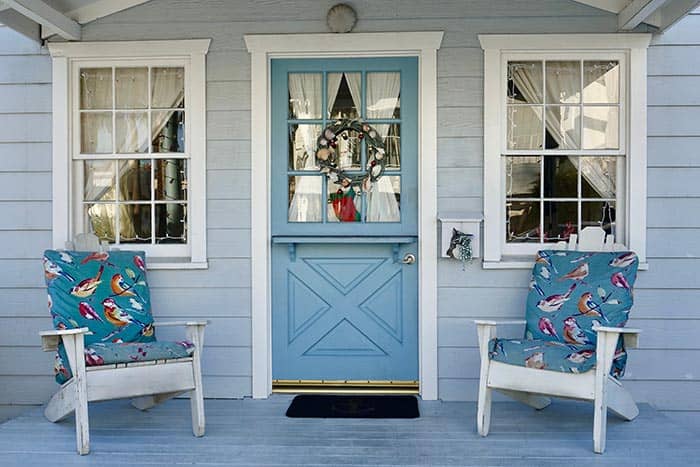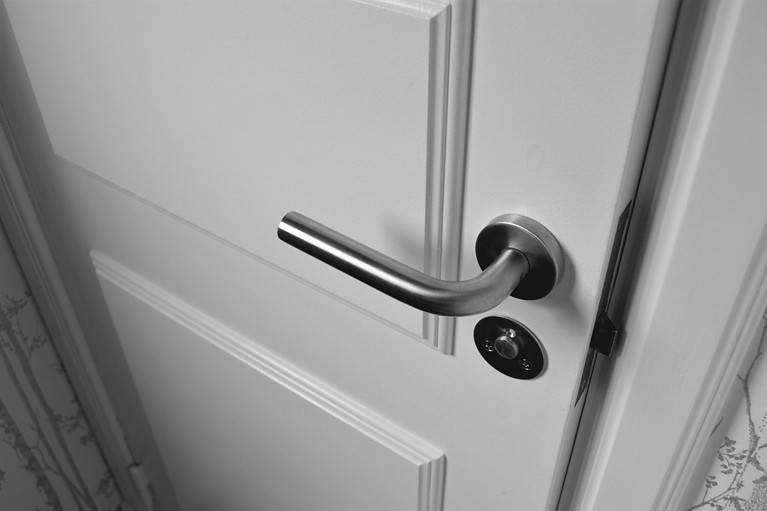Squeaky door hinges are the ultimate mood killers. Whether it’s your front door announcing your late-night snack raid or a rusty hinge creaking like a haunted house, it’s a problem no one wants to deal with.
Ignoring those squeaks and creaks? That can lead to bigger headaches, like worn-out hinge pins or even rust that takes over the entire hinge. But there’s good news!
A little lubrication can work wonders. With the right door lubricant, you can silence those squeaks and keep your hinges moving smoothly.

This guide will walk you through the best door lubricants to tackle every squeaky situation—from white lithium grease for heavy-duty doors to silicone sprays that are perfect for light maintenance. Let’s dive in and get those hinges back in shape!
Why Lubrication Matters for Doors
Proper lubrication is essential for maintaining the functionality and longevity of doors. Without it, door hinges are exposed to constant friction, leading to squeaky, rusty hinges, and even damage to the entire hinge mechanism over time.
When hinges are left untreated, the hinge pins can tear down, making the door harder to open or close. This not only creates noise but also increases stress on the surrounding hardware, such as the screws and frame. Additionally, exposure to moisture can lead to rust, which further accelerates wear and tear.
Using the right door lubricant not only silences squeaky doors but also:
- Prevents Friction: Reducing the strain on moving parts.
- Protects Against Rust: Shielding metal components from corrosion.
- Extends Lifespan: Ensuring the durability of hinges, hinge pins, and other hardware.
For heavily used doors, such as garage doors, regular maintenance with products like white lithium grease or silicone spray is especially important. A well-lubricated door operates smoothly, quietly, and with minimal effort, enhancing both function and comfort.
Factors to Consider When Choosing the Best Door Lubricant
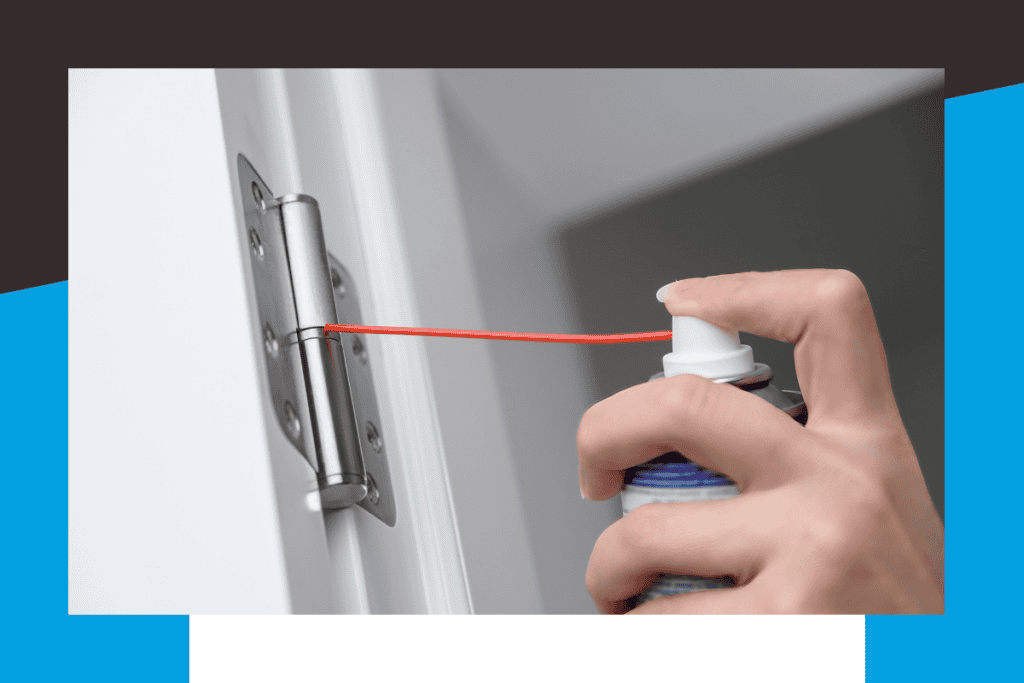
Selecting the right door lubricant depends on several factors, including the type of door, its usage, and the specific issues being addressed. Different lubricants are designed to handle different tasks, from silencing squeaky hinges to protecting rusty hinges.
Here are the key factors to consider:
Types of Door Lubricants
Selecting the right lubricant is key to maintaining door hinges. Different lubricants, such as silicone spray, white lithium grease, and penetrating oil, each have unique properties that make them suitable for specific applications.
Using appropriate lubricants like silicone spray or graphite lubricant after cleaning prevents rust and ensures smooth operation.
Silicone Spray
Silicone spray is highly versatile and can effectively lubricate various surfaces including metal, wood, and rubber. It is valued for its long-lasting durability and resistance to temperature changes, making it an excellent choice for door hinges.
However, silicone spray can potentially damage surfaces like car paint.
White Lithium Grease
This is a favored choice due to its excellent adherence to metal surfaces and ability to withstand heavy friction without degrading. It provides long-lasting lubrication for metal-to-metal contact like door hinges and protects against rust.
This makes it particularly effective for high-traffic door hinges that endure heavy loads, especially when considering one hinge.
Penetrating Oil
This is designed to seep into rusted components, loosening them and restoring functionality. It effectively eliminates squeaks by lubricating joints and hinges that have become tight due to corrosion.
PB Blaster and Liquid Wrench are popular for loosening rusted components while providing lubrication.
2. Application Environment
- Indoor Use: For interior doors, a clean and non-staining option like silicone spray is often preferred. It doesn’t attract dust and provides a smooth finish.
- Outdoor Use: Exterior doors, such as garage doors, are exposed to weather conditions. Products like white lithium grease or weather-resistant silicone sprays are more durable and protective.
3. Ease of Application
Messy applications can be frustrating. Look for lubricants that come with precision nozzles or applicator straws, allowing for controlled use on specific areas like the hinge pins.
4. Longevity
For high-traffic doors, long-lasting lubricants like white lithium grease are more efficient, reducing the need for frequent reapplication.
5. Compatibility with Materials
Always ensure the lubricant is suitable for the surface it’s being applied to, whether it’s metal, plastic, wood, or rubber. Using the wrong product could lead to damage or ineffective results.
Choosing the right lubricant ensures optimal performance and extends the life of door hardware. Whether it’s addressing a squeaky door or protecting against rust, considering these factors can make a significant difference.
Top 10 Door Lubricants for Smooth Operation
Here’s the moment you’ve been waiting for—the best lubricants to fix those squeaky hinges and keep your doors moving like new. Each of these products has been chosen for its performance, versatility, and ease of use.
1. WD-40 Specialist Silicone Spray
What It Does:
This silicone spray is a versatile compound for maintaining door hinges. It’s non-greasy and works great on metal, rubber, and plastic surfaces.
Why It’s Great:
- Resists moisture, preventing rust.
- Dries quickly and doesn’t attract dust.
- Perfect for indoor and outdoor use.
Best For: Routine maintenance on all types of doors, from cabinets to garage doors.
2. Blaster White Lithium Grease
What It Does:
This heavy-duty white lithium grease is designed for high-friction applications, like garage doors and heavily-used hinges.
Why It’s Great:
- Long-lasting lubrication.
- Protects against water and harsh weather.
- Adheres to surfaces without dripping.
Best For: Outdoor doors, rusty hinges, and other heavy-duty tasks.
3. 3-IN-ONE Professional Garage Door Lubricant
What It Does:
This specialized lubricant minimizes friction on hinges, rollers, and tracks, ensuring smooth operation.
Why It’s Great:
- Quick-drying formula leaves no mess.
- Reduces noise on heavily-used doors.
- Works on both metal and plastic parts.
Best For: Garage doors and other large or heavy doors with multiple moving parts.
4. DuPont Teflon Non-Stick Dry-Film Lubricant
What It Does:
DuPont’s dry-film formula creates a slick, non-stick surface that keeps hinges moving freely without attracting dirt or dust.
Why It’s Great:
- Perfect for doors in dusty areas.
- Safe for multiple surfaces, including plastic and wood.
- Protects against rust and corrosion.
Best For: Sliding doors or areas prone to dust accumulation.
5. CRC Heavy Duty Silicone Spray
What It Does:
This heavy-duty silicone spray is designed for metal, rubber, and plastic, offering long-lasting lubrication for indoor and outdoor doors.
Why It’s Great:
- Withstands harsh weather conditions.
- Non-staining and odorless.
- Easy to apply and doesn’t leave a sticky residue.
Best For: Outdoor door maintenance and weatherproofing.
6. Liquid Wrench Penetrating Oil
What It Does:
This oil is a lifesaver for rusty hinges or stuck hinge pins. It loosens corrosion and frees up tight parts.
Why It’s Great:
- Breaks through rust quickly.
- Easy-to-apply formula with a precision nozzle.
- Preps hinges for long-term lubrication.
Best For: Restoring old or heavily corroded hinges.
7. AGS Door Ease Stick Lubricant
What It Does:
This wax-based stick lubricant is simple to apply and leaves no mess, making it ideal for quick fixes.
Why It’s Great:
- No dripping or overspray.
- Safe for metal, wood, and rubber.
- Provides weatherproofing for outdoor hinges.
Best For: Clean, hassle-free applications on hinges or hinge pins.
8. CRC White Lithium Grease Spray
This heavy-duty white lithium grease offers long-lasting protection for high-friction applications. It’s perfect for metal-on-metal contact and provides excellent water resistance.
Key Features:
- Long-lasting, durable formula.
- Ideal for heavy-use doors.
- Resistant to water and moisture.
Best For: Outdoor doors, garage doors, and heavily-used interior doors.
9. LiquidFix Door, Lock, and Hinge Lubricant

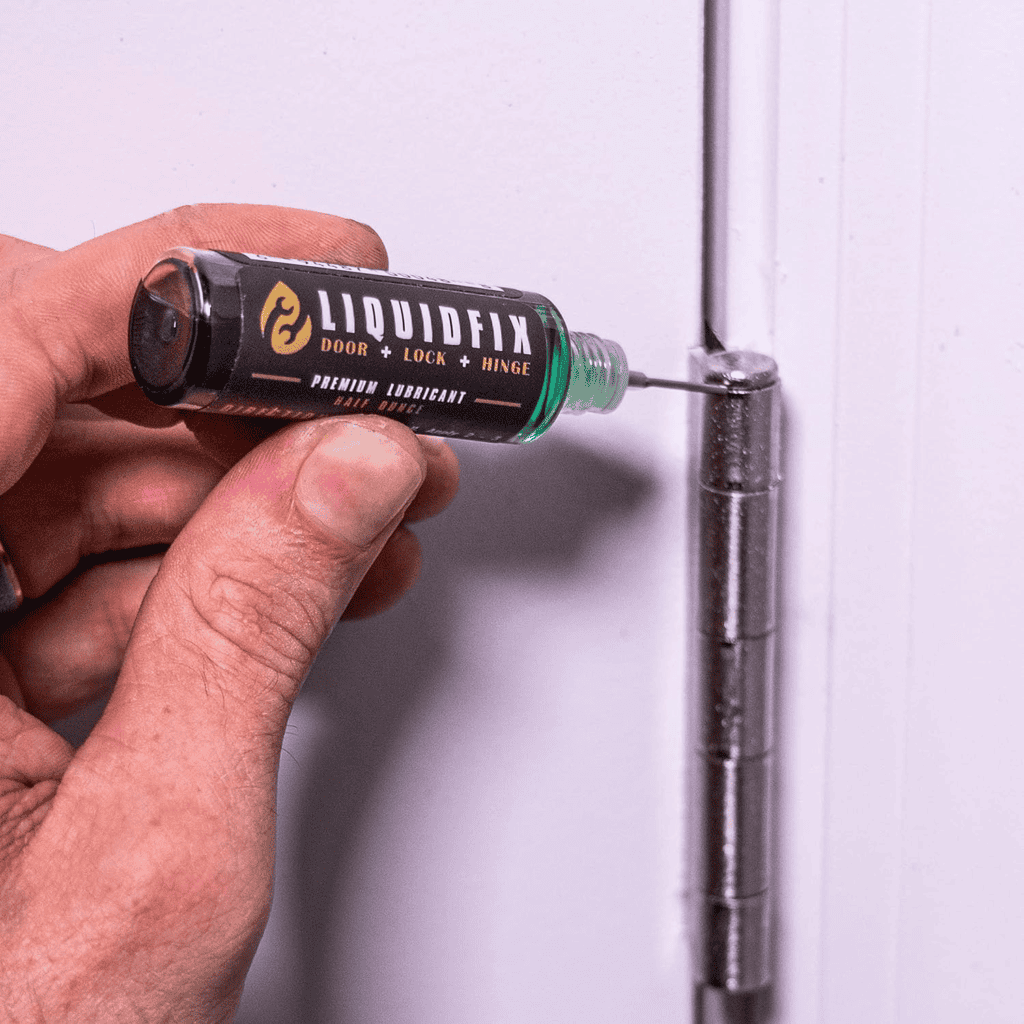
This oil-based lubricant features a needle-tip applicator for precise, mess-free use. It’s perfect for hinges, locks, and small moving parts.
Key Features:
- Penetrates tight spaces with ease.
- Doesn’t drip or attract dirt.
- Suitable for indoor and outdoor use.
Best For: Small, detailed applications like hinge pins and locks.
10. Prime-Line Graphite Lubricant Powder
Unlike sprays or greases, this dry graphite lubricant is ideal for areas where a non-sticky, dust-resistant option is required. It’s great for both door hinges and locks.
Key Features:
- Non-sticky and heat-resistant.
- Easy to apply with a needle-nose tip.
- Won’t damage surrounding materials.
Best For: Locks, small hinges, and areas where a dry lubricant is preferred.
Each of these products is designed to solve specific problems, from silencing squeaks to fighting rust. Whether you’re maintaining your garage door or fixing a squeaky hinge, there’s a perfect solution on this list.


How to Apply Lubricant to Door Hinges Step-by-Step
Correctly applying lubricant to door hinges significantly enhances their functionality and longevity. The process involves preparing the hinge, applying the lubricant, and testing and adjusting as necessary.
Tools You’ll Need
- Your chosen door lubricant (like white lithium grease, silicone spray, or penetrating oil).
- A paper towel or clean rag.
- A hammer (if hinge pins need removal).
- Optional: A small brush for cleaning.
Preparing the Hinge
Regular cleaning and lubrication prevent dirt and grime accumulation on door hinges. To clean hinges, first remove the hinge pins using a flat-head screwdriver and a hammer. For stubborn grime, a metal scraper or sandpaper can be effective in cleaning the hinges.

Before lubrication, remove old grease and dirt from the hinge pin and plates with a disposable cloth. Wipe the hinge with a cloth to remove dirt and old lubricant, ensuring a clean surface for the new application.
Applying the Lubricant
Before: After lubrication, open and close the door several times to help distribute the lubricant within the hinge. Excessive lubricant can attract dirt and debris, leading to sticky hinges instead of smooth operation. It is crucial to avoid overuse and ensure that lubricant is applied directly to the hinge pins for effective results.
After:
- After lubrication, open and close the door several times to help distribute the lubricant within the hinge.
- Avoid excessive lubricant, as it can attract dirt and debris, leading to sticky hinges instead of smooth operation.
- Ensure that lubricant is applied directly to the hinge pins for effective results.
Neglecting hinge pin lubrication can result in accelerated wear and decreased functionality. Apply the lubricant sparingly and evenly, focusing on the hinge pins to ensure they are adequately lubricated.
Testing and Adjusting


After lubrication, test the door’s movement to check for smooth operation, and adjust the hinge screws if necessary to eliminate any remaining noise.
Check for loose or damaged hinges to ensure proper door function.
Pro Tips for Best Results
- Tighten any loose screws on the hinges before lubricating.
- For rusty hinges, apply penetrating oil first, then follow up with a protective product like white lithium grease.
- Repeat this process every 6–12 months or whenever you notice squeaks or difficulty in door movement.
Common Mistakes to Avoid
Lubricating door hinges seems straightforward, but common mistakes can lead to poor performance and potential damage. These include overusing lubricant, ignoring hinge pins, and using the wrong type of lubricant.
- Overusing Lubricant: Overusing lubricant can attract dust and dirt, which leads to more friction instead of reducing it. When too much lubricant is applied, it can create a barrier that causes the hinge to work harder, leading to wear and tear. Apply lubricant sparingly, just a few drops or a light spray is often sufficient to lubricate a hinge.
- Ignoring Hinge Pins: Hinge pins play a crucial role in allowing the door to pivot smoothly, and neglecting them can lead to poor door performance. A common mistake is failing to remove the hinge pins for a thorough cleaning, which can hinder lubrication effectiveness. Ignoring hinge pins can cause the door to squeak persistently despite proper lubrication, leading to frustration.
- Using the Wrong Type of Lubricant: Using the wrong type of lubricant can lead to increased friction, which makes door hinges harder to open and causes premature wear. Inappropriate lubricants can worsen the condition of the hinges and create a sticky residue over time.
Choose lubricants specifically designed for hinges to ensure longevity and effectiveness.
Conclusion
Squeaky doors and sticky hinges don’t have to be a part of your life. With the right door lubricant and a little regular maintenance, you can keep your doors operating smoothly and silently.
Whether you’re fixing squeaky, tackling a rusty hinge, or maintaining a heavily-used garage door, the products and tips we’ve shared are your ultimate toolkit. From white lithium grease for long-lasting protection to silicone sprays for a clean and easy application, there’s a perfect solution for every need.
So, grab a lubricant, follow the steps, and give your doors the TLC they deserve. Got questions? Check out the FAQ section below for more insights.
